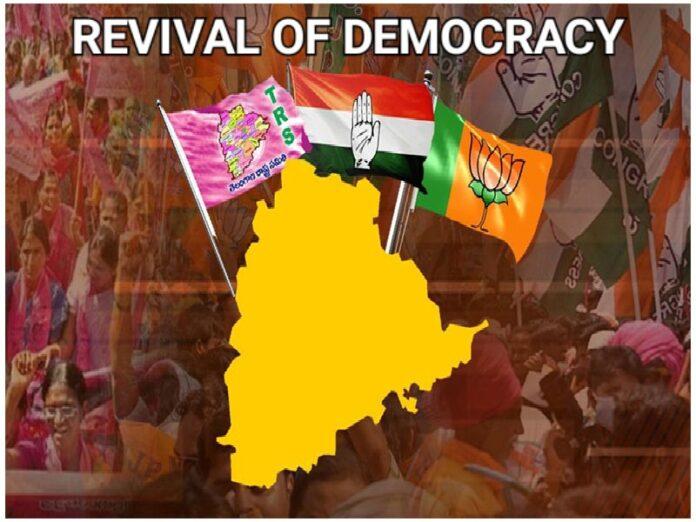The term “revival of democracy” in Telangana can have different meanings depending on the context and speaker.
Here are some possible interpretations:
- Counteracting perceived erosion of democratic values: Some individuals, particularly those in opposition to the current Telangana Rashtra Samithi (TRS) government, may perceive a weakening of democratic institutions and practices in the state. This could include concerns about:
- Limited space for dissent: Allegations of suppression of criticism towards the government or ruling party.
- Erosion of checks and balances: Concerns about the weakening of independent institutions like the judiciary or media.
- Centralization of power: Concerns about the concentration of power within the ruling party or individual leaders.
For these individuals, “revival of democracy” would involve strengthening democratic institutions, ensuring free and fair elections, and promoting open and transparent governance.
- Fulfilling the aspirations of the Telangana statehood movement: The Telangana statehood movement was a long and arduous struggle for self-determination and justice for the people of the region. Some may argue that the movement’s goals haven’t been fully realized, and that “revival of democracy” would involve:
- Empowering marginalized communities: Addressing issues of inequality and ensuring that the benefits of development reach all sections of society.
- Promoting participatory democracy: Increasing public engagement in decision-making processes.
- Delivering on promises of development: Ensuring that the benefits of statehood translate into tangible improvements in people’s lives.
For these individuals, “revival of democracy” would be synonymous with fulfilling the promises made during the statehood struggle.
- Political rhetoric: The term “revival of democracy” may also be used as a political slogan or campaign promise, particularly by opposition parties seeking to unseat the TRS government. In this context, it could be used to rally support by:
- Mobilizing discontent with the current government: Highlighting perceived failures or shortcomings of the TRS regime.
- Promising a better future: Offering an alternative vision for the state, one that is more democratic and just.
- It means righting the deliberate wrongs of the past, acting against those who violated democratic rights of people.
As soon as the clear majority to form the new government emerged, A Revanth Reddy, the Telangana Pradesh Congress Committee (TPCC) president, delivered a 15-minute thanksgiving speech and referred to “revival of democracy” at least nine times. Indeed, within the initial two minutes itself, he uttered the expression “revival of democracy” twice. Protection and revival of human rights as the new government’s objectives were mentioned two more times.
He promised that people could express themselves freely under the new government. He reiterated that his government would work for the “protection of people’s rights and fundamental civil rights”. Referring to the principal Opposition, the BRS, he requested its cooperation in reviving democratic rights.
He promised the government would not allow “the attempts to scuttle democracy”. He also requested the media to cooperate with him in all the measures taken to develop democratic values. He promised that the future would be quite different from the past.
Earlier, he mentioned the revival of democracy as the seventh promise, along with the six promises Congress gave.
Three days after that speech, he himself was sworn in as chief minister and, in his speech after the swearing-in ceremony, again referred to the revival of democracy. Thus, both as the president of the party without administrative power and chief of government who acquired power, he made a promise to the people of Telangana of the revival of democracy.
But what does the realisation of that promise consist of?
Violation of democratic rights
In the last nine years and a half, there has been a gross violation of democratic rights in Telangana. There are hundreds of such incidents and processes of violations, but it would suffice to recollect the major trends to find out the past from which the chief minister wants to take the state into a different future. Even though the track record of Congress concerning violations of democratic rights is not so respectable, the evolving future has to be discussed in the context of the present promises.
Even as the Dharna Chowk (the place delineated for protest sit-ins) was revived thanks to the intervention of the Telangana High Court, all along, the BRS government was quite against allowing it. The TRS, a party that evolved out of the people’s movement, ironically did not relish people expressing their views and registering protest freely.
The first government of Telangana did not consider the people’s right to express their opinions against the government policies or any other matter. It never thought it was the duty of an elected government to respect people’s rights.
In this context, the present government, which talks about the revival of democracy, ought to open all means of communication to allow people’s voices.
Undeclared emergency to stop gatherings
The BRS government clamped an undeclared emergency on all public meetings and gatherings. Indeed, it scuttled or imposed restrictions on several meetings, including memorial gatherings, book release functions, student meetings, and even brainstorming sessions. In other words, the BRS government, with its practice, showed that it does not respect Article 19 (1) of the Indian Constitution.
The meeting halls would be locked or shut down with a huge force of police cordoning off the place. The management of all halls in the state was threatened with a list of the organisations for which the halls should not be let out and even the lists of speakers who would not be allowed to speak.
The popular examples are closing down the Warangal Press Club to scuttle a book release function, locking up Sundraiah Vignana Kendram in Hyderabad to scuttle a press conference, shutting down Telangana Non-Gazetted Officers’ Bhavan to stop a teachers’ organisation from holding a seminar.
An elder brother, who wanted to hold a meeting in memory of his brother at his home, was illegally detained for the whole day in the police station to prevent the commemoration. In fact, except for one or two, all political parties and mass organisations were denied the right to hold public meetings and take out rallies.
Revival of democracy would mean just reversing this situation.
Arrests to counter protests
Another worst example of repression of democratic rights, unheard of even in the erstwhile united Andhra Pradesh, was the arresting of leaders and cadres of mass organisations who announced some form of protest. The police would swoop on them in the early hours of the scheduled day of protest and ensure that the protest did not occur.
Out of dozens of such incidents, the noteworthy was breaking into the house of M Kodandaram and arresting him and several others on the day when unemployed youth were scheduled to hold a protest rally against the delay in recruitment.
Similarly, whenever the chief minister or his son visited any town, dozens of leaders and activists of Opposition political parties and mass organisations would be taken to police stations and detained for the whole day. Or dozens of policemen would be stationed around their houses to prevent them from coming out all day.
Revival of democracy means the immediate withdrawal of such undemocratic practices.
Campaign of lies and half truths
The BRS has developed the usage of all kinds of pressures, including threats, cooption and outright purchase, to subdue the newspapers and TV channels that express different opinions into an art to ensure no dissent appears in mass media. Suppressing the people’s voices on the one hand, it indulged in drowning people in the deluge of lies and half-truths on the other. Thus, crushing all sections that raised their concerns under its iron heel, the ruling party created a situation where people’s genuine problems did not find a voice.
In the ensuing silence of the graveyard, the rulers deluded themselves and duped others into thinking there were no problems for people. In fact, they thought there was no need to solve any of the people’s problems democratically through dialogue and negotiation and used brutal police force alone to silence any grievance. In the last nine-and-a-half years, it was an unadulterated police state that thrived in Telangana.
The rulers have deliberately lost a golden opportunity to resolve the decades-long aspirations of the Telangana people, which have been expressed in various struggles and sacrifices. Indeed, they caused an absolute havoc in public life.
Revival of democracy is equivalent to correcting that destruction.
Always been a police state
Actually, suffering under a police state and violation of civil and democratic rights are not new to Telangana. It has been a police state that Telangana people experienced since the formation of Andhra Pradesh and more so since the 1967 Srikakulam people’s movement. Declaration of “disturbed areas”, letting loose severe repression, imposing bans, foisting false cases, killing people in fake encounters, and violating fundamental rights in Telangana are part of that police state.
The 10-year regime after the state formation not only did not put an end to that tradition but also continued it and raised it to unparalleled levels. Fake encounters continued. Killing people branded as “revolutionaries”, “Islamic terrorists”, and “offenders” extra judicially and with impunity has become the official policy. The report of Justice VS Sirpurkar’s judicial enquiry commission is an eye-opener on how the state indulged in this extra-judicial killing policy.
While banning an armed revolutionary party and six mass organisations in1992 goes to the credit of the erstwhile Andhra Pradesh government, equal credit goes to the Telangana government for continuing the ban and imposing a new ban on more organisations, including the Civil Liberties Committee. (Of course, it was later withdrawn seeing that the high court might strike it down!) It is the Telangana government that banned organisations of students, youth, agricultural labour, coal miners, women, and civil liberties unlike anywhere in the world.
Revival of Democracy means ending the encounter-killing policy and withdrawing the ban on people’s organisations.
Trapping people in false cases
In foisting false cases, the Telangana government’s history is ridiculous and atrocious. Even when there was no offence, action, loss of life and property, Telangana has been one state which used the Unlawful Activities Prevention Act (UAPA) in large measure and indiscriminately, as the draconian law gives scope to criminalise anything, including word of mouth, writing, sign, intention and alleged membership of an organisation.
Those who were shown as accused in these cases have been Adivasis, poets, writers, students, teachers, journalists, advocates, and social activists. There have been more than 30 false cases under this regime, and at least 13 of them have shown thinkers and activists in public life as accused.
When there was a lot of protest against one such particular case, the government announced that it was withdrawing the case against six of them, but even after months, the withdrawal process had not yet begun. Even just two weeks before that government fell, a new false UAPA case was booked.
Though it was the then Congress Home Minister Chidambaram who beefed up the UAPA, again, he has been writing lately against the anarchy let loose in the name of the Act. Similarly, during the nine-and-a-half years, the Telangana government did not do enough to withdraw cases against the activists of the Telangana movement.
Besides these specific repressive measures, there has been an onslaught on the rights of various sections like Adivasis, unemployed youth, peasants, tenants, students, RTC workers, informal sector workers, Anganwadi staff, teachers, and revenue staff.
Revival of democracy in real terms means reviewing and correcting all these undemocratic policies and actions. It also means conducting enquiries against all those officers responsible for those undemocratic practices. It will also mean ensuring that such undemocratic actions and violations of democratic rights will not repeat.
Would the Telangana government stand to its promise of providing a different future than the past?
It’s important to note that the term “revival of democracy” is subjective and open to interpretation. Understanding the context in which it is used, and the perspectives of the speaker, is crucial to accurately assess its meaning. ■ #hydnews #khabarlive #hydkhabar







